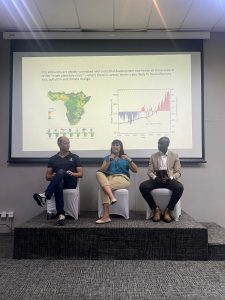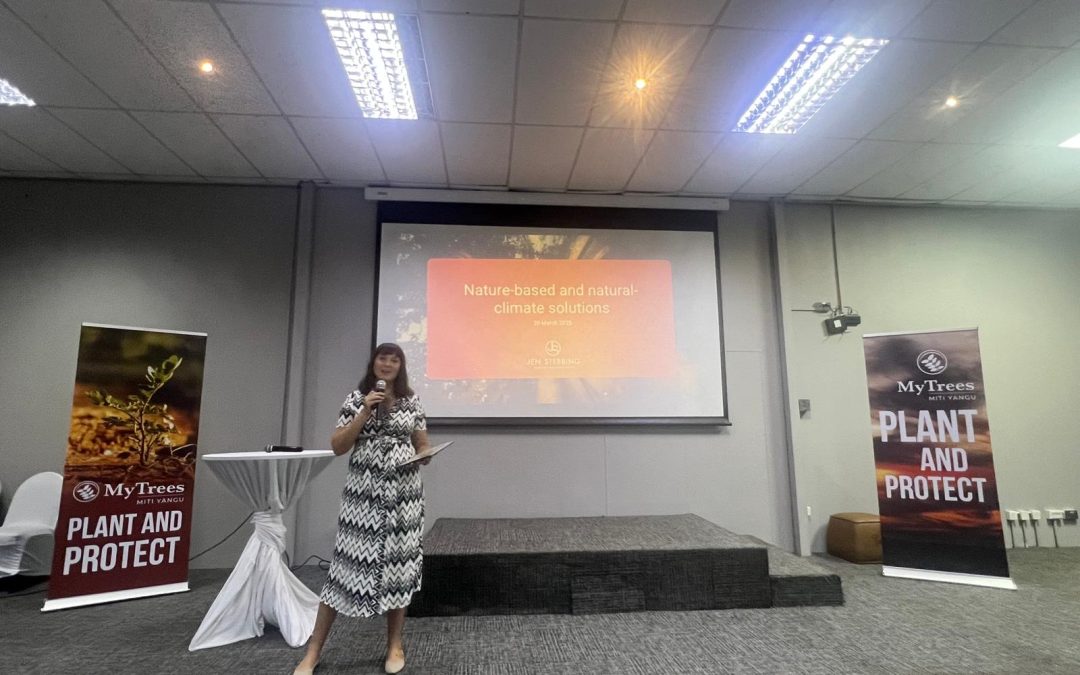Working with nature-based solutions brings me hope. Especially when I see how grounded, practical, and collaborative they can be.
That was my overwhelming takeaway from the “Understanding Nature-Based Solutions in Africa and Zimbabwe” conference hosted last week by My Trees Trust and the Zimbabwe Carbon Association (ZCA) and supported by the UK FCDO. Over two days in Harare, we explored how people are working with nature-based solutions (NbS) across Africa and the real implications for climate, nature, and communities.
It was a world apart from some other carbon conferences I’ve attended. You know the ones, where the panels are packed with information but leave you feeling like your feet have left the ground. Those theoretical discussions are interesting and important, of course, but sometimes I find myself wondering: where’s the soil under our feet? Can we hear from those who are out there implementing this stuff?
In Zimbabwe, it was different. It was local, focused, and refreshingly grounded. It felt like everyone in the room, be they community leaders, NGOs, project developers or investors, was asking: how do we make NbS work even better?
On the first day, I delivered a 101-style presentation on what we mean by NbS and natural climate solutions (NCS). It was a back-to-basics session, covering their potential to deliver up to one-third of the emissions reductions needed by 2030, and why that matters so much. I talked through the structure of voluntary carbon markets, the turbulence they’re currently experiencing, and the urgent need to adopt an “everything, everywhere, all at once” approach to scaling climate action. It was a chance to make sure everyone in the room was on the same page about NbS and NCS before we dug into the complexities in later sessions.
Next, Tony Knowles from Cirrus gave a thought-provoking presentation on the history and complexity of carbon standards. He traced their evolution from the early days of emissions trading schemes right through to today’s emerging rules and updated methodologies. He said that dynamic baselines, hefty auditing costs, and long investment timelines make it difficult for many projects to get off the ground without donor support. He called for more balanced approaches, smarter efficiencies, and regional expertise to ease the burden.
Next, I moderated a panel on the challenges facing NbS projects in Africa. I was joined by Azaria Kilimba, Pauline Nantongo Kalunda and Pondai Dengu—each of them bringing insight from different countries across the continent. We talked about the complexity of projects aligning with government policies, the time and resources required to meet carbon standards, and the ever-critical importance of genuine community engagement. The message was clear: this isn’t about ticking boxes. Respecting cultural and spiritual traditions, building trust, and sharing benefits fairly are not optional extras. They are absolutely central to a project’s success.

Spontaneous Q&A session
One of the most energising parts of the conference for me came on day two, when I joined Nick de Swardt, chair of ZCA, and Zibusiso Moyo from FBC Holdings for a spontaneous Q&A session. We covered everything from fire management as an NbS in Zimbabwe to the risks of taking a neoliberal approach to climate action. The questions kept coming—and rightly so. These are big, complex issues, and it was clear the room was ready to get stuck in.
Zibusiso Moyo also led a standout session in which he made a compelling case for why natural capital matters to the financial sector. In Zimbabwe, where agriculture and tourism rely heavily on the health of ecosystems, NbS are more than a climate strategy—they’re central to economic sustainability. But financing them? That’s still a challenge. He didn’t sugar-coat the barriers, but he did offer a way forward. He wants to see more collaboration between banks, project developers, and civil society to bridge gaps in understanding.
Another session that sparked serious discussion was the panel with Nick De Swardt, Pondai Dengu, and Rory Pilossof. Nick made a point that stuck with me: we should think of ecosystems as our factories. That shift in perspective to view land and biodiversity as central to economic productivity could be transformative. The panel also tackled the tough question of how to value biodiversity, a currency far harder to trade than carbon. And again, community engagement came through as a non-negotiable. No project will thrive without it.
By the end of the conference, I was reminded why grounded conversations matter so much. Theoretical debates have their place. But when you’re sitting in a room with people who are trying to deliver real climate and nature outcomes, it becomes less about carbon per tonne and more about people, ecosystems, and a shared commitment to change. These two days in Zimbabwe left me inspired and hopeful. Now, let’s see what the rest of 2025 brings for NbS.


